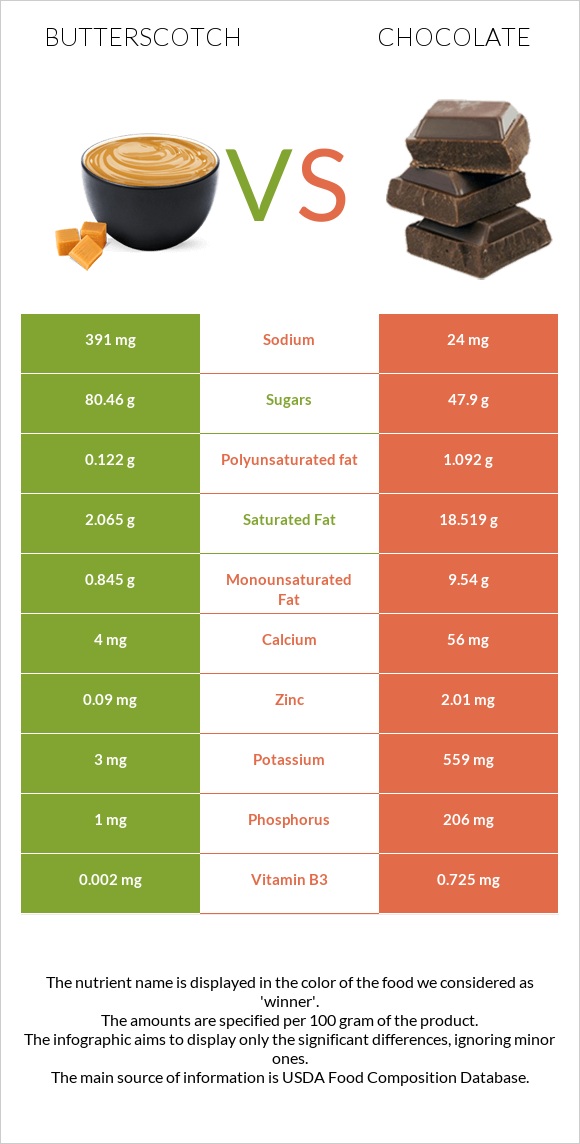Butterscotch vs. Chocolate — In-Depth Nutrition Comparison
Compare
Important differences between butterscotch and chocolate
- Chocolate has more copper, iron, manganese, magnesium, phosphorus, fiber, zinc, and potassium than butterscotch.
- Chocolate's daily need coverage for copper is 114% more.
- Butterscotch contains 16 times more sodium than chocolate. Butterscotch contains 391mg of sodium, while chocolate contains 24mg.
- Butterscotch has a higher glycemic index. The glycemic index of butterscotch is 60, while the glycemic index of chocolate is 23.
The food varieties used in the comparison are Candies, butterscotch and Chocolate, dark, 45- 59% cacao solids.
Infographic

Infographic link
Mineral Comparison
Mineral comparison score is based on the number of minerals by which one or the other food is richer. The "coverage" charts below show how much of the daily needs can be covered by 300 grams of the food.
| Contains more MagnesiumMagnesium | +∞% |
| Contains more CalciumCalcium | +1300% |
| Contains more PotassiumPotassium | +18533.3% |
| Contains more IronIron | +80100% |
| Contains more CopperCopper | +102700% |
| Contains more ZincZinc | +2133.3% |
| Contains more PhosphorusPhosphorus | +20500% |
| Contains less SodiumSodium | -93.9% |
| Contains more ManganeseManganese | +141800% |
| Contains more SeleniumSelenium | +400% |
Vitamin Comparison
Vitamin comparison score is based on the number of vitamins by which one or the other food is richer. The "coverage" charts below show how much of the daily needs can be covered by 300 grams of the food.
| Contains more Vitamin AVitamin A | +1300% |
| Contains more Vitamin EVitamin E | +500% |
| Contains more Vitamin B1Vitamin B1 | +108.3% |
| Contains more Vitamin B2Vitamin B2 | +212.5% |
| Contains more Vitamin B3Vitamin B3 | +36150% |
| Contains more Vitamin B5Vitamin B5 | +7325% |
| Contains more Vitamin B6Vitamin B6 | +∞% |
| Contains more Vitamin B12Vitamin B12 | +∞% |
| Contains more Vitamin KVitamin K | +2600% |
All nutrients comparison - raw data values
| Nutrient |  |
 |
DV% diff. |
| Copper | 0.001mg | 1.028mg | 114% |
| Iron | 0.01mg | 8.02mg | 100% |
| Saturated fat | 2.065g | 18.519g | 75% |
| Manganese | 0.001mg | 1.419mg | 62% |
| Fats | 3.3g | 31.28g | 43% |
| Magnesium | 0mg | 146mg | 35% |
| Phosphorus | 1mg | 206mg | 29% |
| Fiber | 0g | 7g | 28% |
| Monounsaturated fat | 0.845g | 9.54g | 22% |
| Zinc | 0.09mg | 2.01mg | 17% |
| Potassium | 3mg | 559mg | 16% |
| Sodium | 391mg | 24mg | 16% |
| Caffeine | 0mg | 43mg | 11% |
| Protein | 0.03g | 4.88g | 10% |
| Carbs | 90.4g | 61.17g | 10% |
| Vitamin B12 | 0µg | 0.23µg | 10% |
| Calories | 391kcal | 546kcal | 8% |
| Vitamin K | 0.3µg | 8.1µg | 7% |
| Vitamin B5 | 0.004mg | 0.297mg | 6% |
| Polyunsaturated fat | 0.122g | 1.092g | 6% |
| Calcium | 4mg | 56mg | 5% |
| Vitamin B3 | 0.002mg | 0.725mg | 5% |
| Selenium | 0.6µg | 3µg | 4% |
| Vitamin A | 28µg | 2µg | 3% |
| Vitamin E | 0.09mg | 0.54mg | 3% |
| Vitamin B2 | 0.016mg | 0.05mg | 3% |
| Vitamin B6 | 0mg | 0.042mg | 3% |
| Vitamin B1 | 0.012mg | 0.025mg | 1% |
| Net carbs | 90.4g | 54.17g | N/A |
| Cholesterol | 9mg | 8mg | 0% |
| Sugar | 80.46g | 47.9g | N/A |
| Trans fat | 0.112g | N/A | |
| Choline | 0.8mg | 0% | |
| Omega-3 - EPA | 0g | 0.001g | N/A |
| Omega-3 - ALA | 0.085g | N/A | |
| Omega-6 - Eicosadienoic acid | 0.001g | N/A | |
| Omega-6 - Linoleic acid | 0.947g | N/A |
Macronutrient Comparison
Macronutrient breakdown side-by-side comparison
Protein:
0.03 g
Fats:
3.3 g
Carbs:
90.4 g
Water:
5.25 g
Other:
1.02 g
Protein:
4.88 g
Fats:
31.28 g
Carbs:
61.17 g
Water:
0.97 g
Other:
1.7 g
| Contains more CarbsCarbs | +47.8% |
| Contains more WaterWater | +441.2% |
| Contains more ProteinProtein | +16166.7% |
| Contains more FatsFats | +847.9% |
| Contains more OtherOther | +66.7% |
Fat Type Comparison
Fat type breakdown side-by-side comparison
Saturated fat:
Sat. Fat
2.065 g
Monounsaturated fat:
Mono. Fat
0.845 g
Polyunsaturated fat:
Poly. Fat
0.122 g
Saturated fat:
Sat. Fat
18.519 g
Monounsaturated fat:
Mono. Fat
9.54 g
Polyunsaturated fat:
Poly. Fat
1.092 g
| Contains less Sat. FatSaturated fat | -88.8% |
| Contains more Mono. FatMonounsaturated fat | +1029% |
| Contains more Poly. FatPolyunsaturated fat | +795.1% |





